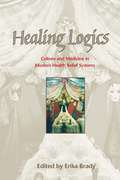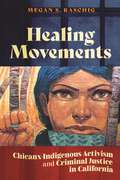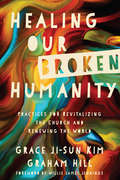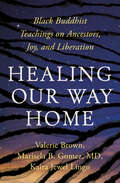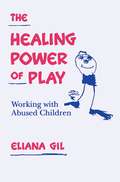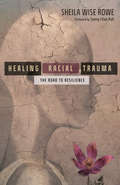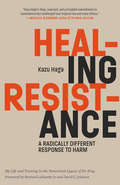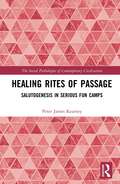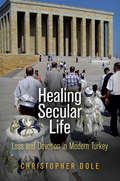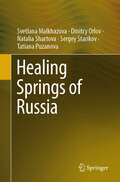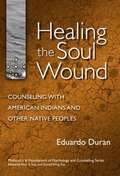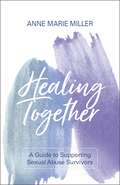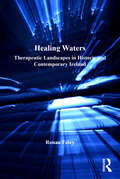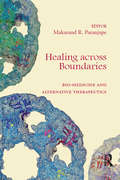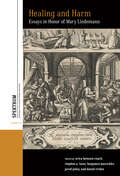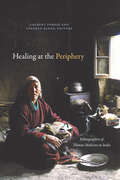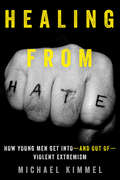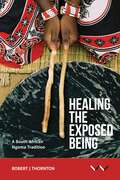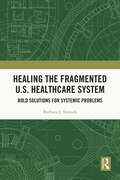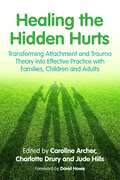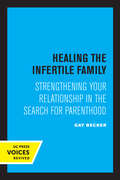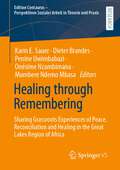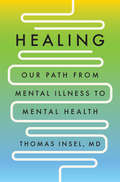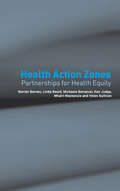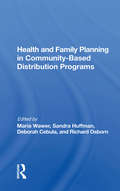- Table View
- List View
Healing Logics: Culture and Medicine in Modern Health Belief Systems
by Erika BradyScholars in folklore and anthropology are more directly involved in various aspects of medicine—such as medical education, clinical pastoral care, and negotiation of transcultural issues—than ever before. Old models of investigation that artificially isolated "folk medicine," "complementary and alternative medicine," and "biomedicine" as mutually exclusive have proven too limited in exploring the real-life complexities of health belief systems as they observably exist and are applied by contemporary Americans. Recent research strongly suggests that individuals construct their health belief systmes from diverse sources of authority, including community and ethnic tradition, education, spiritual beliefs, personal experience, the influence of popular media, and perception of the goals and means of formal medicine. Healing Logics explores the diversity of these belief systems and how they interact—in competing, conflicting, and sometimes remarkably congruent ways. This book contains essays by leading scholars in the field and a comprehensive bibliography of folklore and medicine.
Healing Movements: Chicanx-Indigenous Activism and Criminal Justice in California
by Megan S. RaschigHow a grassroots abolitionist project of cultural healing counters the carceral state in a Chicanx community in CaliforniaFor many, gang involvement can be a guaranteed life sentence, a force which traps them in an inescapable cycle of violence even if it does not lead to actual prison time. Healing Movements explores the work of formerly gang-involved Chicanx men and women in California who draw on the social connections made during their gang-involved years to forge new pathways for cultural healing and countering the carceral system.Known colloquially as the “movement of healing,” this Chicanx-Indigenous abolitionist project based in Salinas, California, was spurred on by a series of four police homicides of Latino men in 2014. Organizing around such issues as police brutality and mass incarceration, these collectives—two of which are discussed in this book, one mixed-gender, and the other women-only—turned to their often obscured Mesoamerican ancestry to find new resources for building a different future for themselves and subsequent generations.Drawing on extensive fieldwork conducted in Salinas, Healing Movements reveals how these communities have taken shape in large part through a conscious effort to uplift Chicanx-Indigenous culture and ceremonial practices. By tapping into their Indigeneity, the members of these collectives access a wealth of new resources to shape their future, opening up novel ways to organize and build strong relational ties that are noteworthy to anyone invested in abolitionist work.
Healing Our Broken Humanity: Practices for Revitalizing the Church and Renewing the World
by Graham Hill Willie James Jennings Grace Ji-Sun KimWe live in conflicted times. Our newsfeeds are filled with inequality, division, and fear. We want to make a difference and see justice restored because Jesus calls us to be a peacemaking and reconciling people. But how do we do this? Based on their work with diverse churches, colleges, and other organizations, Grace Ji-Sun Kim and Graham Hill offer Christian practices that can bring healing and hope to a broken world. They provide ten ways to transform society, from lament and repentance to relinquishing power, reinforcing agency, and more. Embodying these practices enables us to be the new humanity in Jesus Christ, so the church and world can experience reconciliation, justice, unity, peace, and love. With small group activities, discussion questions, and exercises in each chapter, this book is ideal to read together in community. Discover here how to bring real change to a dehumanized world.
Healing Our Way Home: Black Buddhist Teachings on Ancestors, Joy, and Liberation
by Valerie Brown Kaira Jewel Lingo Marisela B. Gomez#1 New Release in Zen Spirituality on Amazon"This powerful trinity of Black authors invites us into the living room of their hearts, affirming who we are with earthy straight talk, textured diversity, and wise tenderness."—Ruth KingReal talk on living joyfully and coming home to ourselves—with reflective self-care practices to help us on our interconnected journeys of liberationJoin three friends, three Black women, all teachers in the Plum Village tradition founded by Zen Master Thich Nhat Hanh, in intimate conversation, touching on the pain and beauty of their families of origin, relationships and loneliness, intimacy and sexuality, politics, popular culture, race, self-care and healing. No subject is out of bounds in this free-flowing, wide-ranging offering of mindful wisdom to nourish our sense of belonging and connection with ancestors.Authors Valerie Brown, Marisela Gomez, MD, and Kaira Jewel Lingo share how the Dharma's timeless teachings support their work for social and racial equity and justice in their work and personal lives. The book offers insights in embodied mindfulness practice to support us in healing white supremacy, internalized racial oppression, and social and cultural conditioning, leading to a firm sense of belonging and abiding joy.
Healing Power of Play
by Eliana GilThis book describes how therapists can both facilitate constructive play therapy and intervene in posttraumatic play to help children who have been traumatized by abuse or neglect achieve a positive resolution. Traditional techniques of play therapy are reviewed for their application to this population. Throughout, numerous therapeutic aids are described to enhance the child's capacity to communicate verbally or symbolically. To help clinicians translate theory into daily practice, the book presents six detailed clinical vignettes that offer step-by-step guidelines for assessment and intervention in different situations of abuse or neglect.
Healing Racial Trauma: The Road to Resilience
by Sheila Wise Rowe"People of color have endured traumatic histories and almost daily assaults on our dignity. We have prayed about racism, been in denial, or acted out in anger, but we have not known how to individually or collectively pursue healing from the racial trauma."
Healing Resistance: A Radically Different Response to Harm
by Kazu HagaActivists and change agents, restorative justice practitioners, faith leaders, and anybody engaged in social progress and shifting society will find this mindful approach to nonviolent action indispensable.Nonviolence was once considered the highest form of activism and radical change. And yet its basic truth, its restorative power, has been forgotten. In Healing Resistance, leading trainer Kazu Haga blazingly reclaims the energy and assertiveness of nonviolent practice and shows that a principled approach to nonviolence is the way to transform not only unjust systems but broken relationships. With over 20 years of experience practicing and teaching Kingian Nonviolence, Haga offers us a practical approach to societal conflict first begun by Dr. Martin Luther King Jr. during the Civil Rights Movement, which has been developed into a fully workable, step-by-step training and deeply transformative philosophy (as utilized by the Women's March and Black Lives Matter movements). Kingian Nonviolence takes on the timely issues of endless protest and activist burnout, and presents tried-and-tested strategies for staying resilient, creating equity, and restoring peace.
Healing Rites of Passage: Salutogenesis in Serious Fun Camps (The Social Pathologies of Contemporary Civilization)
by Peter James KearneyThis book examines how ‘Therapeutic Recreation’ transforms the social health of children enduring or recovering from life-threatening illnesses such as cancer and leukaemia. With studies drawn from ‘Serious Fun’ projects in the USA, the UK, France, Ireland and Israel, the author explores how camp experiences in convivial circumstances help to bring about healing. Employing central concepts from sociology and anthropology, such as 'liminality', 'mimesis' and 'salutogenesis', Healing Rites of Passage explains why a brief secluded holiday can reform the campers’ shared situation of life-threatening illnesses towards health and flourishing. The whole process can be understood in terms of a 'rite of passage', as structured camp experiences enable children to shed previous ‘sick roles’ and pass through a series of challenges in order to achieve social re-integration with a renewed zest for living. An empirically grounded study that reveals the analytic value of master concepts in the social sciences, this book will appeal to scholars in the fields of sociology, anthropology, paediatrics, social theory and the sociology of health, illness and medicine.
Healing Secular Life
by Christopher DoleIn contemporary Turkey--a democratic, secular, and predominantly Muslim nation--the religious healer is a controversial figure. Attracting widespread condemnation, religious healers are derided as exploiters of the sick and vulnerable, discredited forms of Islamic and medical authority, and superstitious relics of a pre-modern era. Yet all sorts of people, and not just the desperately ill, continue to seek them out. After years of research with healers and their patients in working-class neighborhoods of urban Turkey, anthropologist Christopher Dole concludes that the religious healer should be regarded not as an exception to Turkey's secular modern development but as one of its defining figures. Healing Secular Life demonstrates that religious healing and secularism in fact have a set of common stakes in the ordering of lives and the remaking of worlds.Linking the history of medical reforms and scientific literacy campaigns to contemporary efforts of Qur'anic healers to treat people afflicted by spirits and living saints through whom deceased political leaders speak, Healing Secular Life approaches stories of healing and being healed as settings for examining the everyday social intimacies of secular political rule. This ethnography of loss, care, and politics reveals not only that the authority of the religious healer is deeply embedded within the history of secular modern reform in Turkey but also that personal narratives of suffering and affliction are inseparable from the story of a nation seeking to recover from the violence of its own secular past.
Healing Springs of Russia
by Dmitry Orlov Svetlana Malkhazova Natalia Shartova Sergey Starikov Tatiana PuzanovaThis book provides the first diverse and multifaceted textual and cartographic overview of natural curative resources of mineral waters and peloids in Russia.In a readily understandable way the book informs about the genesis, history of exploration and geographical features of water springs, their properties and use as healing springs, as well as specifics and prospect of their contemporary use. The monograph features numerous color illustrations and photos and is oriented toward a general audience but also appeals to geographers, environmental and public health workers and other specialists interested in environmental and public health issues.
Healing The Soul Wound: Counseling With American Indians And Other Native Peoples (Multicutlural Foundations Of Psychology And Counseling)
by Allen E. Ivey Eduardo DuranEduardo Duran―a psychologist working in Indian country―draws on his own clinical experience to provide guidance to counselors working with Native Peoples. Translating theory into actual day-to-day practice, Duran presents case materials that illustrate effective intervention strategies for prevalent problems, including substance abuse, intergenerational trauma, and internalized oppression.
Healing Together: A Guide to Supporting Sexual Abuse Survivors
by Anne MillerSex is such an intimate topic historically wrapped in shame and when someone shares they were sexually abused, we may not know how to respond.With recent #MeToo and #ChurchToo movements, we are learning just how many men, women, boys, and girls have suffered sexual abuse at the hands of a trusted person, often family members or leaders in the church. Sexual abuse is rampant in modern society and now--sometimes many years later--sexual abuse survivors are sharing their stories.Anne Marie Miller is a survivor of childhood clergy sexual abuse and has shared her journey toward healing with audiences all over the world. After speaking with thousands of survivors and their loved ones, she saw the need for a fundamental and practical guide for helping supporters of sexual abuse survivors understand the basics of abuse, trauma, healing, and hope. Drawing from her own experience as a survivor and evidence-based research, Anne addresses these questions and more in Healing Together:What is sexual abuse?How can I help survivors?Who are predators and how do they groom victims?How does trauma affect survivors?What happens when someone doesn't remember the details of their abuse?How does abuse wound the physical, emotional, and spiritual health of people who have been abused?When and how should authorities be contacted?How do you talk to your children about sexual abuse?What are the warning signs of abuse?Is healing possible?Whether you are a spouse, a family member, a friend, or a church leader looking for easy-to-navigate resources to understand and support sexual abuse survivors, you'll find answers and hope in these pages.
Healing Waters: Therapeutic Landscapes in Historic and Contemporary Ireland (Geographies of Health Series)
by Ronan FoleyBringing together a range of different place-studies, including holy wells, spa towns, Turkish baths and sweat-houses, sea-bathing and the modern spa, this book investigates associations between water, health, place and culture in Ireland. It is informed by a humanistic approach, showing how health and place are socially and culturally constructed and how health is embodied, experienced and enacted in place. In addition, the work argues that an understanding of health and place must also consider the historical, societal and cultural orthodoxies that shape and produce those places.
Healing across Boundaries: Bio-medicine and Alternative Therapeutics
by Makarand R. ParanjapeThis unique volume initiates a dialogue between bio-medicine and alternative therapeutics. Undertaking a multidisciplinary exploration of the science and spirituality of healing and wellness, it offers varied perspectives from doctors, medical researchers, Ayurvedic practitioners, philosophers, psychologists, sociologists, and cultural critics. It expands the horizons of health sciences in engaging with diverse traditions — bio-medicine, Ayurveda, Siddha, and Jaina bio-ethics. The book will interest scholars and researchers in social and community medicine, biological sciences, sociology and social anthropology, as well as cultural studies.
Healing and Harm: Essays in Honor of Mary Lindemann (Spektrum: Publications of the German Studies Association #29)
by Erica Heinsen-Roach, Stephen A. Lazer, Benjamin Marschke, Jared Poley, and Daniel RichesProfessor Mary Lindemann inspired several generations of historical researchers in early modern history and culture. She has served as president of the German Studies Association and the American Historical Association and is the author of pathbreaking scholarly work in the history of medicine, urban space, diplomacy, and of women. In honor of her scholarship, service, and dedication, Healing and Harm gathers a group of leading scholars that includes her students, contemporaries, and those who have been inspired by her work to continue Lindemann’s prolific arguments and observations on early modern, central European and German history and culture.
Healing at the Periphery: Ethnographies of Tibetan Medicine in India
by Laurent Pordié and Stephan Kloos, EditorsIndia has long occupied an important place in Tibetan medicine's history and development. However, Indian Himalayan practitioners of Tibetan medicine, or amchi, have largely remained overlooked at the Tibetan medical periphery, despite playing a central social and medical role in their communities. Power and legitimacy, religion and economic development, biomedical encounters and Indian geopolitics all intersect in the work and identities of contemporary Himalayan amchi. This volume examines the crucial moment of crisis and transformation that occurred in the early 2000s to offer insights into the beginnings of Tibetan medicine's professionalization, industrialization, and official recognition in India and elsewhere. Based on fine-grained ethnographic studies in Ladakh, Zangskar, Sikkim, and the Darjeeling Hills, Healing at the Periphery asks how the dynamics of capitalism, social change, and the encounter with biomedicine affect small communities on the fringes of modern India, and, conversely, what local transformations of Tibetan medicine tell us about contemporary society and health care in the Himalayas and the Tibetan world.Contributors. Florian Besch, Calum Blaikie, Sienna R. Craig, Barbara Gerke, Isabelle Guérin, Kim Gutschow, Pascale Hancart Petitet, Stephan Kloos, Fernanda Pirie, Laurent Pordié
Healing from Hate: How Young Men Get Into--and Out Of--violent Extremism
by Michael KimmelBy the time Matthias was in seventh grade, he felt he’d better belong to some group, lest he be alone and vulnerable. The punks and anarchists were identifiable by their tattoos and hairstyles and music. But it was the skinheads who captured his imagination. They had great parties, and everyone seemed afraid of them. “They really represented what it meant to be a strong man,” he said. What draws young men into violent extremist groups? What are the ideologies that inspire them to join? And what are the emotional bonds forged that make it difficult to leave, even when they want to? Having conducted in-depth interviews with ex–white nationalists and neo-Nazis in the United States, as well as ex-skinheads and ex-neo-Nazis in Germany and Sweden, renowned sociologist Michael Kimmel demonstrates the pernicious effects that constructions of masculinity have on these young recruits. Kimmel unveils how white extremist groups wield masculinity to recruit and retain members—and to prevent them from exiting the movement. Young men in these groups often feel a sense of righteous indignation, seeing themselves as victims, their birthright upended in a world dominated by political correctness. Offering the promise of being able to "take back their manhood," these groups leverage stereotypes of masculinity to manipulate despair into white supremacist and neo-Nazi hatred. Kimmel combines individual stories with a multiangled analysis of the structural, political, and economic forces that marginalize these men to shed light on their feelings, yet make no excuses for their actions. Healing from Hate reminds us of some men's efforts to exit the movements and reintegrate themselves back into society and is a call to action to those who make it out to help those who are still trapped.
Healing the Exposed Being: The Ngoma healing tradition in South Africa
by Robert ThorntonThis ethnography explores the Ngoma healing tradition as practiced in eastern Mpumalanga, South Africa. ‘Bungoma’ is an active philosophical system and healing practice consisting of multiple strands, based on the notion that humans are intrinsically exposed to each other and that this is the cause of illness, but also the condition for the possibility of healing. This healing seeks to protect the ‘exposed being’ from harm through augmenting the self. Unlike Western medicine, it does not seek to cure physical ailments but aims to prevent suffering by allowing patients to transform their personal narratives of Self. Like Western medicine, it is empirical and is presented as a ‘local knowledge’ that amounts to a practical anthropology of human conflict and the environment. The book seeks to bring this anthropology and its therapeutic applications into relation with global academic anthropology by explaining it through political, economic, interpretive, and environmental lenses
Healing the Fragmented U.S. Healthcare System: Bold Solutions for Systemic Problems
by Barbara SowadaThrough a systems perspective, this insightful book challenges the current state of healthcare in the United States, arguing for overarching reforms that would lead ultimately to universal healthcare coverage across the country.Written by the president of the board of trustees of a rural hospital, the book highlights the chronic issues facing American healthcare today, namely high costs, poor health outcomes, excessive health inequalities, and a lack of trust. It uses systems thinking principles – used in hospitals themselves to improve efficiency, quality, and safety of care – to show how the fragmented system could be transformed by addressing these issues holistically. The book also gives suggestions for rebuilding trust, respect, and mutual cooperation, issues which are also critical in healing the current system.Grounded in the author’s direct experience in facing the challenges of dealing with a fragmented system in America today, this perceptive book will interest graduate students in healthcare administration, policy, or leadership programs, as well as scholars in these and related fields.
Healing the Hidden Hurts: Transforming Attachment and Trauma Theory into Effective Practice with Families, Children and Adults
by David Howe Caroline Archer Christine Gordon Helen O'Shea Hannah Fryer Victoria Drury Tamara Gordon Jonny Matthew Helen Jury Marie Martin Kate Mcinnes Charlotte Drury Tricia Skuse Jude Hills Lisa Waycott Viv Norris Ann Cartwright Emma Birch Claire Carbiss Elaine Simpson Jane MacnamaraHealing the Hidden Hurts: Transforming Attachment and Trauma Theory into Effective Practice with Families, Children and Adults provides a unique collection of professional and personal responses to the challenges that arise in dealing with attachment difficulties. With contributions from social workers, adoptive parents, adoptees, psychologists, therapists, counsellors and other related professionals, this book provides a varied and expansive approach to explaining attachment theory. The authors speak from personal experience to deliver explanations of theory, how they relate to practice and to provide practical guidance on how to improve the physical, emotional and psychological development of children in care across a broad range of professional settings. This book provides valuable insights relevant to practitioners within the fields of social work, health, education, the criminal justice system and any independent and voluntary sectors working with children and families.
Healing the Infertile Family: Strengthening Your Relationship in the Search for Parenthood
by Gay BeckerUnlike most infertility books that focus on medical treatment, Healing the Infertile Family examines the social and emotional problems experienced by couples confronting infertility and suggests how they can be alleviated. In this updated edition, Gay Becker discusses her most recent study of couples experiencing infertility and offers guidelines for resolution of this common problem that will enable couples to face the future with hope. This title is part of UC Press's Voices Revived program, which commemorates University of California Press’s mission to seek out and cultivate the brightest minds and give them voice, reach, and impact. Drawing on a backlist dating to 1893, Voices Revived makes high-quality, peer-reviewed scholarship accessible once again using print-on-demand technology. This title was originally published in 1990.
Healing through Remembering: Sharing Grassroots Experiences of Peace, Reconciliation and Healing in the Great Lakes Region of Africa (Edition Centaurus - Perspektiven Sozialer Arbeit in Theorie und Praxis)
by Karin E. Sauer Penine Uwimbabazi Dieter Brandes Onésime Nzambimana Mumbere Ndemo MbasaThis educational handbook displays grassroots experiences of peace, reconciliation, and healing in the Great Lakes region of Africa, in which Burundian, Congolese, and Rwandan authors share their understandings and practices of Memory Work. They committed to do so in a joint Participatory Action Research Team together with German facilitators. The team members ‘opened their archives’ on the traumatizing effects of the severe conflicts that each of these countries experienced. Their learnings and findings from this research process are collected in this book, which aims to resolve remaining tensions resulting from past experiences. Displaying a variety of strategies that lead to a Healing of Memories, it is high time to integrate such discourses into a mainly Western-European-centered scientific community. In this way, the book aims to fill the academic void regarding the German-colonial legacy of violence in the three neighboring countries, which was fueled under colonial rule. As such, this book is central to current discourses on the decolonization of science in terms of authorship, research ethics, and methods.
Healing: Our Path from Mental Illness to Mental Health
by Thomas InselA bold, expert, and actionable map for the re-invention of America&’s broken mental health care system.&“Healing is truly one of the best books ever written about mental illness, and I think I&’ve read them all." —Pete Earley, author of CrazyAs director of the National Institute of Mental Health, Dr. Thomas Insel was giving a presentation when the father of a boy with schizophrenia yelled from the back of the room, &“Our house is on fire and you&’re telling me about the chemistry of the paint! What are you doing to put out the fire?&” Dr. Insel knew in his heart that the answer was not nearly enough. The gargantuan American mental health industry was not healing millions who were desperately in need. He left his position atop the mental health research world to investigate all that was broken—and what a better path to mental health might look like. In the United States, we have treatments that work, but our system fails at every stage to deliver care well. Even before COVID, mental illness was claiming a life every eleven minutes by suicide. Quality of care varies widely, and much of the field lacks accountability. We focus on drug therapies for symptom reduction rather than on plans for long-term recovery. Care is often unaffordable and unavailable, particularly for those who need it most and are homeless or incarcerated. Where was the justice for the millions of Americans suffering from mental illness? Who was helping their families? But Dr. Insel also found that we do have approaches that work, both in the U.S. and globally. Mental illnesses are medical problems, but he discovers that the cures for the crisis are not just medical, but social. This path to healing, built upon what he calls the three Ps (people, place, and purpose), is more straightforward than we might imagine. Dr. Insel offers a comprehensive plan for our failing system and for families trying to discern the way forward. The fruit of a lifetime of expertise and a global quest for answers, Healing is a hopeful, actionable account and achievable vision for us all in this time of mental health crisis.
Health Action Zones: Partnerships for Health Equity
by Marian Barnes Helen Sullivan Linda Bauld Ken Judge Michaela Benzeval Mhairi MackenzieHealth Action Zones (HAZ) were one of the earliest and most prominent area-based initiatives launched by the New Labour government in England soon after it came to power in 1997. Written by members of the team undertaking the national evaluation of HAZ, this book examines the initiative’s development and impact from a variety of perspectives. It outlines important features of the social, policy and evaluative environment within which HAZ were established and discusses enduring themes such as building and developing capacity with diverse and unequal partners within complex policy systems. Multidisciplinary in nature, the book provides in-depth analysis of a key policy initiative, offering guidance on how best to design, implement and evaluate future initiatives intended to deal with fundamental social problems.
Health And Family Planning In Community-based Distribution Projects
by Richard Osborn Maria Wawer Sandra Huffman Deborah CebulaThe authors of this book address the major issues involved in developing and evaluating community-based delivery (CBD) healthcare services administered by nonmedical workers in developing countries. Ranging from a general discussion of integrated community-based programs to the prescription of dose regimens that nonmedical personnel can use in field situations, the contributions cover such topics as nutrition intervention, antihelminthics distribution, oral rehydration therapy, and the efficacy of existing programs designed to train those who administer these services.
